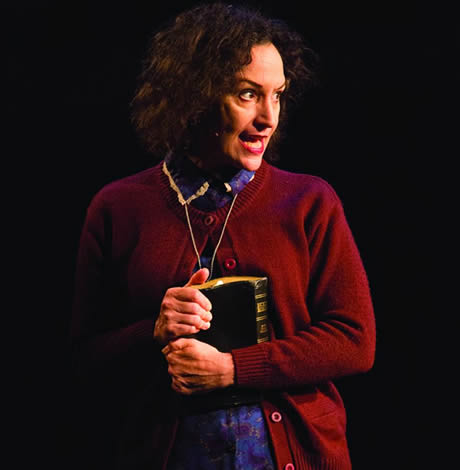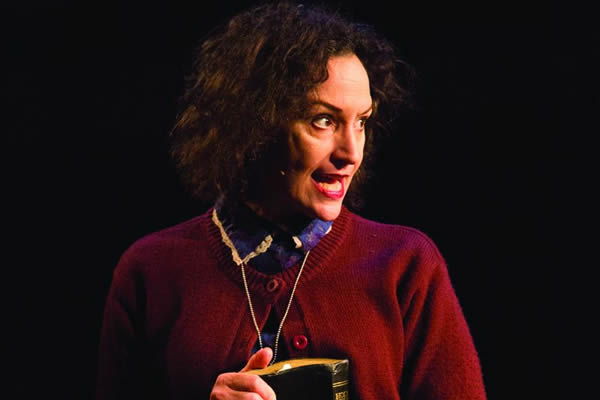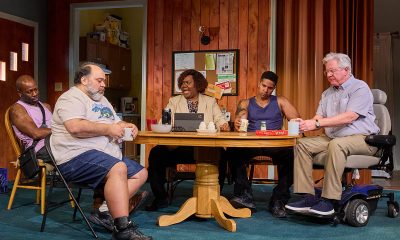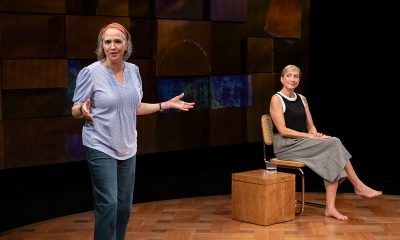Arts & Entertainment
‘Company’ and beyond
‘Carrie’ actress recalls memorable Stritch encounters


Barbara Walsh as Margaret in ‘Carrie: the Musical.’ (Photo courtesy Studio Theatre)
When Barbara Walsh was preparing to play Joanne, the iconic character created by the legendary Elaine Stritch, in the Broadway revival of “Company,” friends were quick to point out that she had large shoes to fill.
“That’s OK,” the actress wryly responded. “I have really large feet.” She also adds, “And they keep getting bigger with age. Bunions are hell.”
Walsh, now onstage as Margaret White in “Carrie the Musical” at Studio Theatre, which runs through Aug. 3 (studiotheatre.org) was shocked when she heard that Stritch died last Thursday.
“It’s a huge loss to the Broadway community,” she says.
When Walsh was in previews for “Company” in 2006, the New Yorker wanted to do a joint interview with the new and old Joanne. As Walsh arrived at the Carlyle (Stritch’s long-time residence in Manhattan), Stritch looked her up and down and declared in her stentorian voice, “Oh, you’re too young to play the part.” Walsh did not mention that she was older than Stritch was when she originated the role.
Stritch, of course, dominated the interview (which was unfortunately never published), but Walsh remembers that the two had a lovely conversation about composer Stephen Sondheim. As Walsh was leaving, Stritch said she was looking forward to seeing the new production, but wouldn’t tell her when she was coming to see the show so she wouldn’t make the younger actress nervous.
As reimagined by British director John Doyle, the Broadway revival of “Company” featured the actors doubling as the orchestra. As the hard-drinking Joanne, Walsh played the triangle and other percussion instruments, most memorably striking a martini glass with a swizzle stick. The cast never left the stage, so Walsh had plenty of time to scan the audience. One night she spotted a woman in an aisle seat in the fifth row dressed in white from head to foot, including, of course, a white hat.
“It was Stritch,” Walsh says. “You couldn’t miss her.”
After the show (“It was a lovely performance”), Walsh was headed from the wig room to her dressing room when she heard a voice booming down the stairwell. “Where’s Barbara?” Stritch bellowed. She descended the staircase and gently grabbed Walsh by the face, quietly saying, “That was just wonderful.”
“It was such a magical moment, a moment I’ll never forget. We just won’t see anyone like her ever again.”
Now Walsh has several pairs of large shows to fill as she tackles the role of Carrie’s murderous mother. There were Piper Laurie and Julianne Moore on the big screen, and Barbara Cook, Betty Buckley and Marin Mazzie in earlier productions of the stage musical. Walsh did not see those other stage performances, but she does remember watching the famous Brian De Palma film for the first time as a teenager.
“I remember being absolutely terrified of Piper Laurie,” she says. “Her performance was simply amazing. Seeing her come down the stairs in her nightgown carrying that knife was delicious. … When you’re playing a role with this rich history, you just have to stay on track and tell the story. It’s an amazing story about a lot of fascinating things.”
For Walsh, the essence of the character is a mother who is terrified of letting her daughter go, rather than religious zealotry or sexual repression, although these elements are also important. The key to the role is deep maternal love.
“That helps me to tell her story in a more grounded way. It was important for me to play the humanity against the madness. I was also very interested in the role reversal between the mother and daughter. It is terrifying to Margaret when Carrie takes over. When Carrie unleashes her telekinetic powers at the end of act one, Margaret is suddenly in uncharted waters. That is very interesting to play.”
One of the most complicated moments for the tangled character is the haunting act two ballad, “When There’s No One.” It illuminates Margaret’s tortured decision to kill her daughter. Walsh says it’s “such a beautiful song, an unbearable life-shifting moment for Margaret that leads to her psychotic break.” She credits the creative team of Michael Gore (music), Dean Pitchford (lyrics) and Lawrence D. Cohen (book) for laying out the moment so well in the script and creating such a multi-layered song.
Despite the excellent writing, Walsh still says the song was a struggle.
“It’s not easy. It’s a very tricky shift and I’m still finding it in some ways.”
Before the song starts, Margaret watches Carrie cross the sage in her home-made prom dress. As Walsh watches Emily Zickler, she says, “a tiny smile that quickly goes away crosses my face. I don’t know if anyone notices, but for me, its Margaret’s last moment of humanity before the madness takes over. The song starts a cappella — that was my decision — because Margaret is super vulnerable in that moment. The song brings together all of Margaret’s conflicting emotions, that she needs to save Carrie’s soul, that she wants to stop her daughter from making the mistakes she made, her anger that Carrie will leave her for someone else, her fear that Carrie will be taunted again and her dread of the horrible loneliness she will feel when Carrie is gone.”
Born in Chevy Chase, the D.C. native calls New York home now, but has returned to the area to star in Studio’s 2008 production of “Grey Gardens” and in “Vanya and Sonia and Masha and Spike” at Center Stage in Baltimore earlier this year. In addition to “Company,” Walsh’s Broadway credits include “Blood Brothers,” “Hairspray,” “Nine” and “Falsettos,” William Finn’s ground-breaking musical about AIDS. Walsh is thrilled to be back at Studio Theatre tackling this incredible role, but is looking forward to returning to her husband (Jack Cummings, artistic director of the Transport Group) and dog in Manhattan.
Theater
‘Bad Books’ a timely look at censorship in local library
Influencer vs. conservative parent in Round House production

‘Bad Books’
Through May 4
Round House Theatre
4545 East-West Highway
Bethesda, Md.
Tickets start at $43
Roundhousetheatre.org
While a library might seem an unlikely place for a heated contretemps, it’s exactly the spot where adults go when they’re itching to battle out what books minors might be allowed to read.
In Sharyn Rothstein’s “Bad Books,” two women, The Mother (out actor Holly Twyford) and The Librarian (Kate Eastwood Norris), swiftly become mired in a quarrel that comes with some weighty repercussions.
The Mother is a popular conservative influencer on a mission. She’s furious that the local library has overstepped its bounds and she blames The Librarian, a woman who adheres to the “it takes a village” method of child rearing and is dedicated to the young people who approach her reference desk.
There’s some background. It seems The Librarian who dresses young (tight jackets and Doc Martens) and curses a blue streak, forged a friendship with Jeremy, a teenage library regular.
While the details are a bit hazy, it seems the troubled Jeremy confided in The Librarian regarding some personal issues. In return, she suggested a helpful book – Boob Juice.
Unsurprisingly, based solely on its title, the book has thrown The Mother into a pique of outrage. After finding Boob Juice in her son’s bedroom, she made a beeline to the library; and not incidentally, The Mother hasn’t read the recommended work and has no plans to do so.
Set in a suburb with lax gun laws, the story explores facets of division and conciliation. The Mother insists she isn’t so much about banning books as she is keeping some books away from young people until they’ve obtained parental approval.
“Bad Books” is performed in the round. Built on a rotating stage, Meghan Raham’s set is simple, pleasingly serviceable, and easily transforms from the library into a small corporate office, and later the assembly room of a church. Overhead floats a circular glass shelf filled with a cache of banned books. Things like a rolling book cart and a goldfish bowl add some flavor to the different locations.
The Mother wasn’t always a popular conservative warrior with an enthusiastic horde of followers.
Her past includes penning a book that later filled her with guilt and regret. She refers to that early questionable literary accomplishment as her bad book. And while over the years, she has persevered to find and destroy each and every printed copy, she hasn’t entirely succeeded.
Norris plays three women who figure meaningfully into the arc of Twyford’s mother character. In addition to The Librarian, Norris is The Manager, a broadly played piece of comic relief, and The Editor, a warm woman who reveals things about Jeremy that his own mother never knew.
Smartly staged by Ryan Rilette, the production is part of a National New Play Network Rolling World Premiere. While Rothstein’s script offers two strong roles (skillfully performed by celebrated actors Twyford and Norris), its ending feels too neatly resolved.
In the past, Twyford and Norris have successfully joined forces for numerous DMV productions including Studio Theatre’s production of David Auburn’s two-hander “Summer, 1976,” the story of a longtime and unlikely friendship between two women who meet as young mothers during the Bicentennial summer.
Though different, both The Librarian and The Mother share a strong and ultimately hopeful relationship with words.
There’s a quote from E.B. White’s classic “Charlotte’s Web” that pops up a couple of times in the briskly paced 80-minute play. Charlotte, the wise spider, says, “with just the right words you can change the world.”
Books
‘Pronoun Trouble’ reminds us that punctuation matters
‘They’ has been a shape-shifter for more than 700 years

‘Pronoun Trouble’
By John McWhorter
c.2025, Avery
$28/240 pages
Punctuation matters.
It’s tempting to skip a period at the end of a sentence Tempting to overuse exclamation points!!! very tempting to MeSs with capital letters. Dont use apostrophes. Ask a question and ignore the proper punctuation commas or question marks because seriously who cares. So guess what? Someone does, punctuation really matters, and as you’ll see in “Pronoun Trouble” by John McWhorter, so do other parts of our language.

Conversation is an odd thing. It’s spontaneous, it ebbs and flows, and it’s often inferred. Take, for instance, if you talk about him. Chances are, everyone in the conversation knows who him is. Or he. That guy there.
That’s the handy part about pronouns. Says McWhorter, pronouns “function as shorthand” for whomever we’re discussing or referring to. They’re “part of our hardwiring,” they’re found in all languages, and they’ve been around for centuries.
And, yes, pronouns are fluid.
For example, there’s the first-person pronoun, I as in me and there we go again. The singular I solely affects what comes afterward. You say “he-she IS,” and “they-you ARE” but I am. From “Black English,” I has also morphed into the perfectly acceptable Ima, shorthand for “I am going to.” Mind blown.
If you love Shakespeare, you may’ve noticed that he uses both thou and you in his plays. The former was once left to commoners and lower classes, while the latter was for people of high status or less formal situations. From you, we get y’all, yeet, ya, you-uns, and yinz. We also get “you guys,” which may have nothing to do with guys.
We and us are warmer in tone because of the inclusion implied. She is often casually used to imply cars, boats, and – warmly or not – gay men, in certain settings. It “lacks personhood,” and to use it in reference to a human is “barbarity.”
And yes, though it can sometimes be confusing to modern speakers, the singular word “they” has been a “shape-shifter” for more than 700 years.
Your high school English teacher would be proud of you, if you pick up “Pronoun Trouble.” Sadly, though, you might need her again to make sense of big parts of this book: What you’ll find here is a delightful romp through language, but it’s also very erudite.
Author John McWhorter invites readers along to conjugate verbs, and doing so will take you back to ancient literature, on a fascinating journey that’s perfect for word nerds and anyone who loves language. You’ll likely find a bit of controversy here or there on various entries, but you’ll also find humor and pop culture, an explanation for why zie never took off, and assurance that the whole flap over strictly-gendered pronouns is nothing but overblown protestation. Readers who have opinions will like that.
Still, if you just want the pronoun you want, a little between-the-lines looking is necessary here, so beware. “Pronoun Trouble” is perfect for linguists, writers, and those who love to play with words but for most readers, it’s a different kind of book, period.
The Blade may receive commissions from qualifying purchases made via this post.

Friday, April 18
“Center Aging Friday Tea Time” will be at 2 p.m. on Zoom. This is a social hour for older LGBTQ+ adults. Guests are encouraged to bring a beverage of choice. For more details, email [email protected].
Go Gay DC will host “LGBTQ+ Community Social in the City” at 7 p.m. at Hotel Zena. This event is ideal for making new friends, professional networking, idea-sharing, and community building. This event is free and more details are available on Eventbrite.
Trans and Genderqueer Game Night will be at 6 p.m. at the DC Center for the LGBT Community. This will be a relaxing, laid-back evening of games and fun. All are welcome and there’ll be card and board games on hand. Feel free to bring your own games to share. For more details, visit the DC Center’s website.
Saturday, April 19
Go Gay DC will host “LGBTQ+ Community Brunch” at 11 a.m. at Freddie’s Beach Bar & Restaurant. This fun weekly event brings the DMV area LGBTQ+ community, including Allies, together for delicious food and conversation. Attendance is free and more details are available on Eventbrite.
LGBTQ People of Color Support Group will be at 7 p.m. on Zoom. This peer support group is an outlet for LGBTQ People of Color to come together and talk about anything affecting them in a space that strives to be safe and judgement free. There are all sorts of activities like watching movies, poetry events, storytelling, and just hanging out with others. For more information and events for LGBTQ People of Color, visit thedccenter.org/poc or facebook.com/centerpoc.
“Spark Sapphic Social” will be at 8 p.m. at Spark Social House. This weekly sapphic social is an opportunity to mix and mingle with other sapphics in D.C.’s newest LGBTQ bar. This event is free and more details are available on Eventbrite.
“DC Drag Brunch on Rooftop – Penthouse (Formerly at Lima Twist)” will be at 12 p.m. at Baby Shank Rooftop. Hosted by Miss Capital Pride, this is the ultimate drag brunch experience in Washington, D.C., featuring the fiercest queens around. Prepare to be entertained by glamorous drag queens and celebrated celebrity impersonators, including Taylor Swift, Lady Gaga, Beyoncé, Britney Spears, Nicki Minaj, Ariana Grande, Whitney Houston, Cher and many more. Tickets cost $27 and are available on Eventbrite.
Sunday, April 20
Queer Crayon Club will host “Queer Sketch Social” at 3 p.m. at Sinners and Saints. This is a fun event for LGBTQ+ adults to come together and color. Attendance is free and more details are available on Eventbrite.
Monday, April 21
“Center Aging Monday Coffee & Conversation” will be at 10 a.m. on Zoom. This is a social hour for older LGBTQ+ adults. Guests are encouraged to bring a beverage of choice. For more details, email [email protected].
Tuesday, April 22
Genderqueer DC will be at 7 p.m. on Zoom. This support group is for people who identify outside of the gender binary. Whether you’re bigender, agender, genderfluid, or just know that you’re not 100% cis – this is your group. For more details, visit www.genderqueerdc.org or Facebook.
Coming Out Discussion Group will be at 7 p.m. on Zoom. This is a peer-facilitated discussion group and a safe space to share experiences about coming out and discuss topics as it relates to doing so. For more details, visit the group’s Facebook.
Wednesday, April 23
Job Club will be at 6 p.m. on Zoom. This is a weekly job support program to help job entrants and seekers, including the long-term unemployed, improve self-confidence, motivation, resilience and productivity for effective job searches and networking — allowing participants to move away from being merely “applicants” toward being “candidates.” For more information, email [email protected] or visit thedccenter.org/careers.
Asexual and Aromantic Discussion Group will be at 7 p.m. on Zoom. This is a space where people who are questioning this aspect of their identity or those who identify as asexual and/or aromantic can come together, share stories and experiences, and discuss various topics. For more details, email [email protected].
Thursday, April 24
Virtual Yoga with Sarah M. will be at 7 p.m. on Zoom. This is a free weekly class focusing on yoga, breath work, and meditation. For more details, visit the DC Center for the LGBT Community’s website.
DC Anti-Violence Project Open Meeting will be at 7 p.m. on Zoom. This meeting is open to anyone interested in learning more and getting involved in lessening violence both within and directed towards the LGBT communities. For more information, visit Facebook or Twitter.
-

 State Department5 days ago
State Department5 days agoHIV/AIDS activists protest at State Department, demand full PEPFAR funding restoration
-

 District of Columbia5 days ago
District of Columbia5 days agoCapital Pride wins $900,000 D.C. grant to support WorldPride
-

 Obituary4 days ago
Obituary4 days agoLocal attorney, LGBTQ rights advocate Dale Sanders dies at 75
-

 U.S. Federal Courts3 days ago
U.S. Federal Courts3 days agoFederal judge blocks Trump passport executive order












